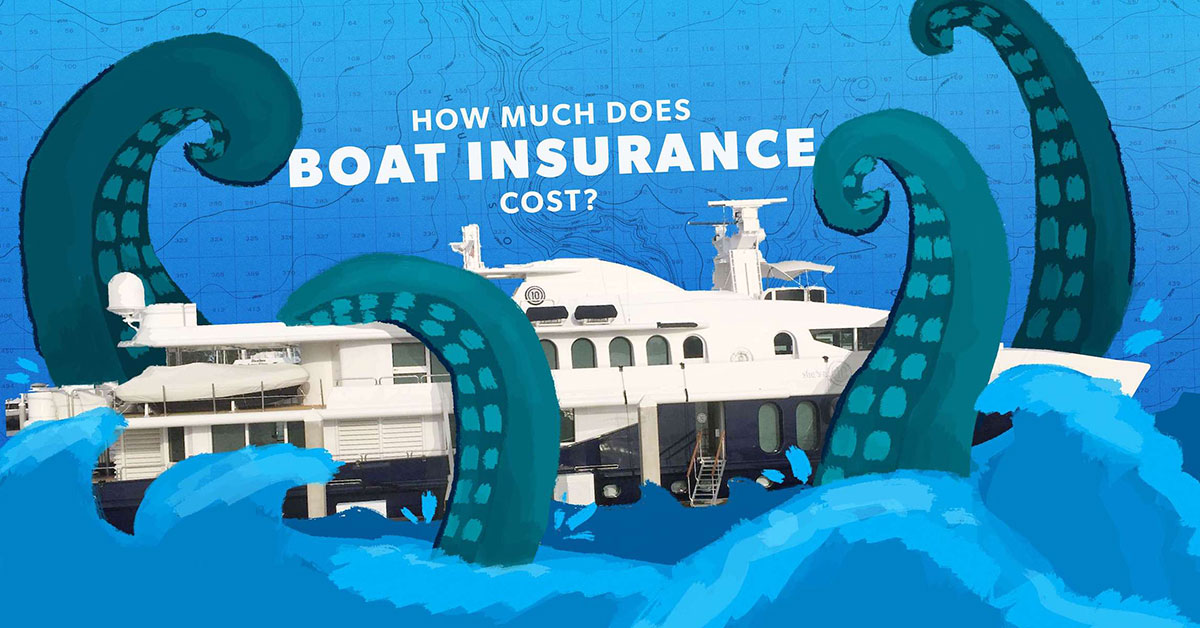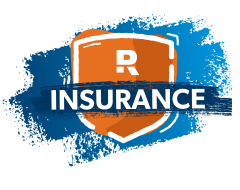
Boats are a highlight of summer! They’re flashy, fun . . . and freaking expensive to repair or replace. That’s why it’s better to pay for boat insurance than to hope you’ll get by with zero accidents.
Boat insurance protects you financially if your boat is involved in an accident where property gets damaged or someone gets hurt. On average, boat insurance costs $200 to $500 a year—or around 1–5% of your boat’s value if you have a big, powerful or expensive boat.
Let’s talk about what affects the average boat insurance cost, what it covers and where to get it.
Do I Really Need Boat Insurance?
That depends on your boat. A standard homeowners insurance policy will generally cover small, inexpensive watercraft like:
- Kayaks
- Canoes
- Jon boats
- Paddle boats
- Boats with low-powered engines (usually less than 25 horsepower or less than 25 mph maximum speeds)
You can also add a liability rider to your homeowners insurance to cover property damage or injuries if you get in an accident with another boater.
But homeowners policies won’t cover big, powerful boats. You’ll need boat insurance for:
- Charter Boats – Since your boat is your business, you may also need commercial insurance.
- Fishing Boats – including bass boats, fancy offshore rigs and everything in between
- Houseboats – Just like insuring a regular house, you need to insure your home on the water too.
- Personal Watercraft – Watercraft like jet skis are super fun, but they’re also risky—hence the insurance.
- Pontoons – Pontoons are where the party’s at! So make sure your boat and your passengers are protected.
- Sailboats – Activities like long distance travel, racing or historical reenactments require special coverage. Think of sailboats as the classic cars of the sea.
- Speedboats – Fast boats are at higher risk for accidents—which makes insurance a must.
- Yachts – Luxury vessels need insurance because they’re more valuable and travel farther than most other boats.
All these boats need insurance even if it isn’t required by state law. Why? Because if you’re uninsured, a boating accident can ruin your future—in more ways than one.
Boating accidents caused $55 million in property damage in 2019—and that’s not counting medical bills and lost wages for the 2,559 people who got injured. To make matters worse, 613 people died in boating accidents that year.1
If you cause those damages, injuries or (God forbid) deaths, you’ll be held liable. That’s why boat insurance is so important: It protects you financially after an accident, so you can focus on more important things.
How Much Is Boat Insurance?
The average cost of boat insurance is $200 to $500 a year—although for a really big or expensive boat (like a yacht or sailboat), insurance can cost around 1–5% of the boat’s value. For example, you may pay about $2,500 a year to insure a $100,000 yacht.
But just like other insurance rates vary, boat insurance costs change depending on you and your boat.
Get trusted coverage that fits your budget.
When you work with a RamseyTrusted pro, you can feel confident knowing they’re going to find the best policy for you at the best price.
What Factors Affect Boat Insurance Costs?
Many of the factors that affect car insurance rates also affect boats—but there are also some unique things to consider for watercraft.
Type of Boat
The more valuable a boat is, the more expensive it is to insure. For example, yacht insurance almost always costs more than pontoon insurance because yachts are more expensive.
Motor
High-powered watercraft are riskier, so insurance companies look at the type of motor (inboard or outboard, amount of horsepower and so on). Slow and steady usually wins the race to get low insurance rates!
Condition
To be considered in good condition, your boat must meet the U.S. Coast Guard safety standards from the time when it was built. Otherwise, you’ll pay higher premiums because of your boat’s outdated safety features.
Age
Your boat’s age matters—and so does yours.
Older boats are generally cheaper to insure, especially if they’ve only had one owner. You’ll probably also get better rates if you’re between 25 and 60 years old, because that’s when insurers think you’re the most responsible.
Uses
Fishing and floating are lower risk than towing water skis or wakeboards. If you use your boat for “risky” activities, your insurance company will charge you higher premiums to make up for the accident they expect you to have.
Frequency
Boating accidents almost always happen on the water (duh). So if you occasionally take your boat out, you’ll pay less than if you boat every weekend. That’s also why people who live up north typically pay less for boat insurance—the shorter boating season means less time for accidents.
Location
Speaking of where you live, you’ll pay higher premiums for boating in an area with hurricanes (on the ocean), squalls (in the Great Lakes) or other hazards. And you’ll pay less if you live in a state with no coastline. That’s because lakes and rivers are typically safer than the ocean.
Driving Record
You’ll likely get low rates if you’ve got a good driving record (aka no accidents, injuries or recent insurance claims in a boat or car). But your inexperienced teen or your reckless cousin who’s totaled three cars? Not so much.
What Boat Insurance Discounts Can I Get?
There are a lot of ways to save money on boat (or even car) insurance. You can get discounts if you:
- Take boating safety classes
- Use a diesel-powered engine
- Carry ship-to-shore radios, Coast Guard approved fire extinguishers and other safety equipment onboard
- Bundle your boat, home and auto insurance
- Pay your insurance yearly
- Choose a high deductible
- Don’t file a claim for at least two years
What Does Boat Insurance Cover?
Boat insurance covers many costs of an accident—like repairs, salvage and medical bills. Let’s walk through the types of coverage you can get.
Liability
Liability is the most important type of boat insurance. It pays for the other person’s repair and medical bills after an accident you caused. And if someone sues you? Your liability coverage should help pay the legal fees.
You can even look into guest passenger liability, which covers you if someone driving your boat with your permission causes an accident
Liability also covers repairs to docks or other objects you hit—plus clean-up costs for oil and other pollutants that your boat released into the water. (Which is good since cleaning up even a small oil spill is insanely expensive.)
Without liability coverage, you’ll have to pay for damages to boats, docks, personal property, a person’s health or the environment. That’s a lot of money. So play it safe and let the insurance company pay instead.
Physical Damage
Physical damage coverage pays to repair or replace your boat if something bad happens to it, like:
- Collisions with other boats, docks, submerged objects or floating debris
- Damage from wind, hail, lightning or other weather
- Theft or vandalism
- Fire
You can even get an “all risk” policy: Unless a risk is specifically excluded, your insurance will cover anything that happens to your boat—even sinking.
How much your insurance company will pay to repair or replace your boat depends on what type of physical damage policy you choose.
Agreed Value Policy
You and the insurance company work together to decide how much your boat is worth—and that’s the most your insurer will pay you after a covered accident. So if your sailboat’s agreed value is $95,000, your insurer will pay up to $95,000 to replace or repair it.
Agreed value policies offer plenty of coverage for most boats. But if you own a rare boat that’s increasing in value, it will eventually outgrow the agreed value you chose. That’s where the next type of policy comes in.
Actual Cash Value Policy
This policy pays up to the boat’s market value on the day it got damaged. That means you should be able to restore your boat or buy a similar one. You just won’t be able to upgrade on the insurance company’s dime.
For example, let’s say your boat is worth $12,000 and it sinks. The insurance company will only pay you $12,000—even if you originally paid more to buy the boat.
Medical Payments
This coverage helps pay for medical expenses if you or your passengers get hurt on your boat. It can cover all sorts of injuries from a collision with another boat or even taking a nosedive on water skis.
Personal Property
Personal property coverage helps replace the unattached accessories that made your boat so much fun in the first place—like your fishing gear, navigation system and personal items.
You can even get insurance for your boat trailer (which may be helpful if you’re new to towing trailers).
Uninsured Watercraft
Imagine that a speedboat makes a huge wake and pushes your boat into some sharp rocks. Your boat is damaged—but the other guy is uninsured. Yikes!
Uninsured watercraft coverage will help pay for your repairs (or medical bills if you or your passengers get hurt). That’s much easier than suing the other boater or—worse—having to foot the bill yourself.
Salvage
If your boat becomes disabled on the open water, you’ll need to get it towed back to land. That’s what salvage insurance helps pay for.
You can also get insurance that helps pay to remove your boat from the water if it sinks—otherwise, the wreckage could become a hazard to other boaters and cause even more accidents.
What Boat Insurance Doesn’t Cover
One thing boat, home and auto insurance all have in common: They don’t cover every situation. Here’s what boat insurance doesn’t cover.
Normal Wear and Tear
Boats get old and wear out just like any other machine. So your insurer won’t pay for cosmetic or mechanical issues that come from normal use.
Faulty Machinery
While your insurance policy might cover a mechanical breakdown if it’s out of the ordinary, it won’t cover manufacturer defects or things that broke because you used them wrong or didn’t take care of them. (So you may want to clean out that clogged water pump now.)
Animal Damage
Animals can be a big boating hazard—literally. If a run-in with a dolphin, manatee or other marine animal damages your boat, your insurance policy most likely won’t cover it.
(By the way, it pays to know what animals live in your boating area so you don’t harm them, your boat or the environment.)
Infestations
Another animal that’s not covered? Mussels! These little guys can do major damage. But the insurance company won’t pay for it—or damage from insects, mold or other infestations. It’s smart to check your boat and remove any unwanted passengers.
Improper Storage and Transportation
Your boat falls off the trailer because you didn’t tie it down? Your “winter storage” is in the yard? Your insurance company will chalk those damages up to your careless behavior and make you pay the bill.
Accidents Beyond Your Navigational Limits
Your navigational limit is where you and the insurance company agree you can boat. Your insurance policy only covers you in that area. Sail outside of it, and you’re on your own.
Accidents Outside Your Layup Period
A layup period is when you take your boat out of the water for a while (usually the winter). If you use your boat after your layup starts or before it’s over, you won’t be covered.
Underage or Unnamed Operators
Each state makes its own rules about how old a kid has to be before they can drive a boat, so check the local laws before letting them take the wheel. And if your child (or another adult) drives your boat regularly, it’s smart to put their name on your insurance policy.
Where Do I Get Boat Insurance?
The easiest way to get boat insurance is to work with an independent auto or homeowners insurance agent.
Our network of Endorsed Local Providers (ELPs) will compare policies from multiple insurers to find the best one for your boat. And our agents will go a step further: They’ll teach you how to actually understand your boat insurance policy so you can be confident you’re getting the insurance you need—without costly extras.
Get coverage you can trust.
When a RamseyTrusted pro is in your corner, you have an insurance guide you can trust who will give you confidence in your coverage.




